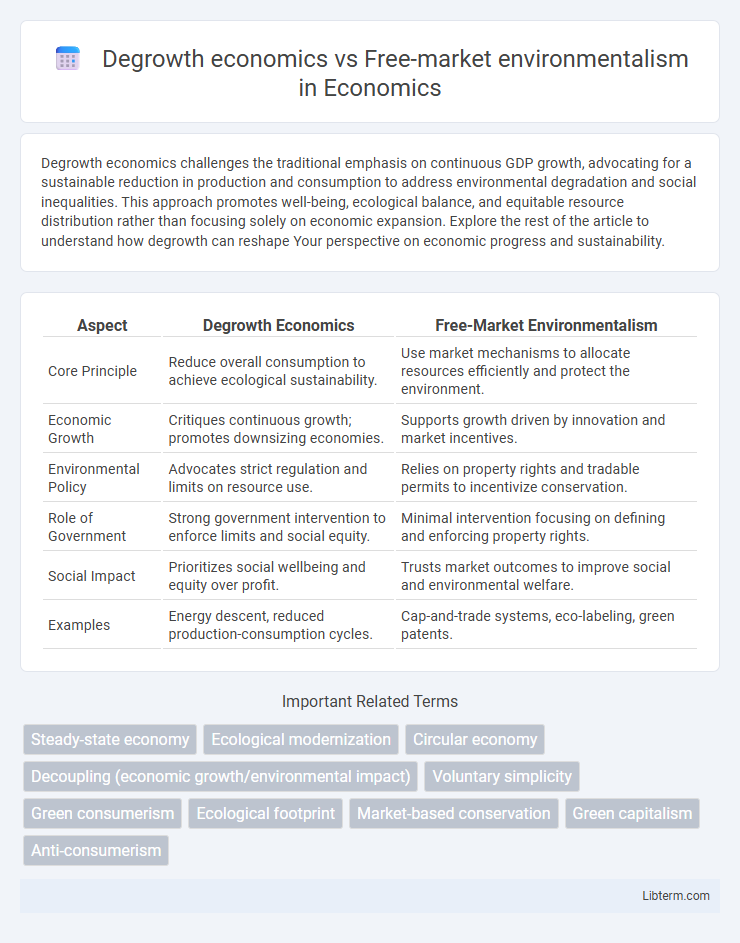Degrowth economics challenges the traditional emphasis on continuous GDP growth, advocating for a sustainable reduction in production and consumption to address environmental degradation and social inequalities. This approach promotes well-being, ecological balance, and equitable resource distribution rather than focusing solely on economic expansion. Explore the rest of the article to understand how degrowth can reshape Your perspective on economic progress and sustainability.
Table of Comparison
| Aspect | Degrowth Economics | Free-Market Environmentalism |
|---|---|---|
| Core Principle | Reduce overall consumption to achieve ecological sustainability. | Use market mechanisms to allocate resources efficiently and protect the environment. |
| Economic Growth | Critiques continuous growth; promotes downsizing economies. | Supports growth driven by innovation and market incentives. |
| Environmental Policy | Advocates strict regulation and limits on resource use. | Relies on property rights and tradable permits to incentivize conservation. |
| Role of Government | Strong government intervention to enforce limits and social equity. | Minimal intervention focusing on defining and enforcing property rights. |
| Social Impact | Prioritizes social wellbeing and equity over profit. | Trusts market outcomes to improve social and environmental welfare. |
| Examples | Energy descent, reduced production-consumption cycles. | Cap-and-trade systems, eco-labeling, green patents. |
Introduction to Degrowth Economics and Free-Market Environmentalism
Degrowth economics advocates for the intentional downscaling of production and consumption to achieve ecological sustainability and social equity, emphasizing limits to growth and the redefinition of prosperity beyond GDP. Free-market environmentalism relies on property rights and market mechanisms to address environmental issues, promoting incentives for conservation and efficient resource use through voluntary exchanges. Both approaches present contrasting frameworks for integrating economic activity with environmental stewardship.
The Core Principles of Degrowth Economics
Degrowth economics centers on reducing production and consumption to achieve ecological sustainability and social equity by prioritizing well-being over GDP growth. It emphasizes the need for deliberate downscaling of resource use, redistribution of wealth, and community-based decision-making to address environmental limits. This approach contrasts with free-market environmentalism, which relies on market mechanisms and private property rights to manage resources efficiently.
Fundamental Tenets of Free-Market Environmentalism
Free-market environmentalism centers on the belief that property rights and market mechanisms efficiently allocate environmental resources and address pollution through incentives. It posits that well-defined property rights enable owners to manage resources sustainably, while market prices reflect the true social costs and benefits of environmental goods. This economic framework trusts voluntary exchanges and legal systems over government intervention to promote environmental stewardship and innovation.
Environmental Sustainability: Contrasting Approaches
Degrowth economics advocates for a deliberate reduction in production and consumption to achieve environmental sustainability by minimizing resource extraction and ecological degradation. Free-market environmentalism relies on market mechanisms, property rights, and technological innovation to incentivize conservation and efficient resource use. These contrasting approaches reflect a fundamental debate between limiting economic expansion for ecological balance versus leveraging economic growth and market forces to address environmental challenges.
Economic Growth vs. Ecological Limits
Degrowth economics emphasizes reducing economic growth to respect ecological limits, advocating for sustainable resource use and reduced consumption to prevent environmental degradation. Free-market environmentalism supports economic growth through market mechanisms, arguing that property rights and innovation drive efficient resource allocation and environmental protection. The core debate contrasts degrowth's emphasis on stabilizing or shrinking economies to maintain ecological balance with free-market environmentalism's belief in growth-compatible environmental stewardship.
Policy Mechanisms: Regulation vs. Market Incentives
Degrowth economics advocates for strict regulatory policies to limit resource consumption and enforce environmental sustainability, emphasizing caps, bans, and direct intervention to reduce ecological footprints. Free-market environmentalism relies on market incentives such as tradable permits, carbon pricing, and property rights to internalize environmental costs, encouraging innovation and efficient resource use through economic signals. The tension between these approaches centers on government control versus market-driven solutions to address environmental degradation effectively.
Social and Economic Impacts
Degrowth economics advocates for reducing consumption and production to achieve environmental sustainability, which often results in decreased GDP but aims to improve social well-being and equity by prioritizing community resilience and reduced inequality. Free-market environmentalism relies on market mechanisms and property rights to address environmental issues, promoting economic growth and innovation while expecting environmental protection through efficient resource allocation and incentives. Social impacts of degrowth include potential job restructuring and lifestyle changes, whereas free-market environmentalism tends to preserve existing economic frameworks but may struggle with equitable resource distribution and long-term sustainability.
Criticisms and Challenges of Degrowth Economics
Criticisms of degrowth economics emphasize its perceived impracticality in fostering economic stability and growth, arguing that reducing production and consumption could lead to increased unemployment and social inequality. Challenges include the difficulty of implementing degrowth policies in global capitalist systems reliant on continuous growth and the potential resistance from industries and consumers accustomed to perpetual economic expansion. Skeptics also question whether degrowth can effectively address environmental issues without compromising technological innovation and economic incentives that drive sustainable solutions.
Debates Surrounding Free-Market Environmentalism
Free-market environmentalism emphasizes using market mechanisms, property rights, and incentives to promote sustainable resource management and environmental protection. Critics argue that relying solely on market forces may neglect externalities, leading to under-provision of public goods and environmental degradation. Debates surrounding free-market environmentalism focus on its effectiveness in addressing climate change, biodiversity loss, and regulating pollution compared to state intervention or degrowth economics.
Future Prospects for Sustainable Economic Models
Degrowth economics emphasizes reducing consumption and production to achieve ecological sustainability and social well-being, promoting localized economies and equitable resource distribution. In contrast, free-market environmentalism relies on property rights and market incentives to address environmental challenges, encouraging innovation and efficient resource use through competitive markets. Future prospects for sustainable economic models may involve integrating degrowth principles with market mechanisms to balance ecological limits with economic flexibility, fostering a resilient and adaptive approach to global sustainability.
Degrowth economics Infographic

 libterm.com
libterm.com